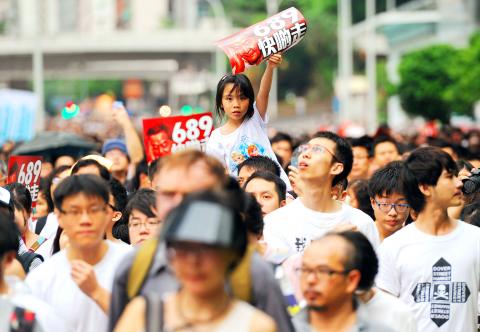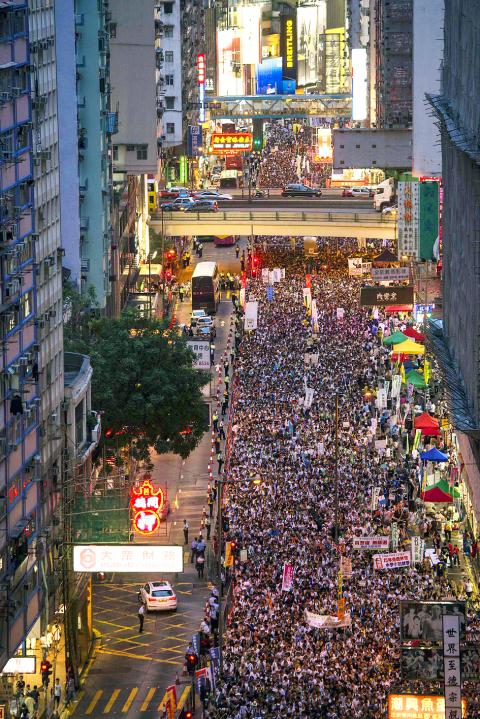Tens of thousands of pro-democracy protesters marched in Hong Kong yesterday, with many calling for the territory’s leader to be sacked, in what could turn out to be the biggest and most passionate challenge to Chinese Communist Party rule in more than a decade.
Hong Kong Chief Executive Leung Chun-ying (梁振英) said his government would do its “utmost” to move toward universal suffrage and stressed the need for stability after nearly 800,000 voted for full democracy in an unofficial referendum.
Tensions flared early as activists from the League of Social Democrats burned a copy of a “white paper” released by Beijing last month that reasserted the central government’s authority over the former British colony, enraging many. The group also burned a portrait of Leung.

Photo: AFP
Security was tight with tension running high among pro-democracy activists after the referendum highlighted the deep divide in the territory of more than 7 million people. Aerial shots showed key arteries packed with marchers.
Roads were closed off around Victoria Park, a small, green oasis named after the former British queen, where the rally started as demonstrators marched to the central business district surrounded by police.
“I think the people’s wish on this vote is very clear and they are not taken in by recent suggestions that we should pocket whatever we are offered in the hope that more would come later. This is just rubbish,” said Anson Chan (陳方安生), Hong Kong’s former top civil servant and a key supporter of the unofficial referendum.

Photo: Reuters
Organizers of the annual rally, marking the day the territory returned to China in 1997, were expecting the largest turnout since 2003, when half a million people demonstrated against proposed anti-subversion laws which were later scrapped.
Then-Hong Kong chief executive Tung Chee-hwa (董建華) stepped down in March 2005, nearly two years before completing his second five-year term.
“I think in view of the vote of almost 800,000 people in favor of democracy, real democracy, not the type of democracy Beijing is suggesting, that today is probably going to be one of the most pivotal moments in the history of the democratic movement in Hong Kong,” said lawyer Sean Leonard, from the think tank HKU International Institute of Financial Law. “It’s about time Beijing woke up.”
Pro-democracy groups are demanding greater democracy in elections for the territory’s chief executive in 2017.
Chinese authorities are keen to ensure that only pro-Beijing candidates make it on to the ballot. Democracy activists want the nomination process to be open to everyone.
Hong Kong returned to China with wide-ranging autonomy under the formula of “one country, two systems,” allowing such protests to take place, but China bristles at open dissent, especially over sensitive political matters such as demands for universal suffrage and the annual June 4 vigil in Hong Kong remembering the Tiananmen Square Massacre in Beijing in 1989.
In Beijing, Chinese Vice President Li Yuanchao (李源潮) urged a visiting Hong Kong youth group yesterday to make sure young people “staunchly uphold one country, two systems” and “pass on the fine tradition of patriotism and loving Hong Kong,” Xinhua news agency reported.
Beijing’s Liaison Office in Hong Kong went further.
“We are firmly against the radical and illegal activities launched by very few people, because we all have responsibilities to defend the bottom line of law which Hong Kong people cherish,” office head Zhang Xiaoming (張曉明) said in apparent reference to the referendum and planned protests.
“Central government firmly supports the universal suffrage in Hong Kong, and its sincerity and determination is unswerving. This kind of sincerity and determination won’t have any change or shake because of the so-called referendum or the scale of the march,” Zhang said.

A magnitude 7.0 earthquake struck off Yilan at 11:05pm yesterday, the Central Weather Administration (CWA) said. The epicenter was located at sea, about 32.3km east of Yilan County Hall, at a depth of 72.8km, CWA data showed There were no immediate reports of damage. The intensity of the quake, which gauges the actual effect of a seismic event, measured 4 in Yilan County area on Taiwan’s seven-tier intensity scale, the data showed. It measured 4 in other parts of eastern, northern and central Taiwan as well as Tainan, and 3 in Kaohsiung and Pingtung County, and 2 in Lienchiang and Penghu counties and 1

FOREIGN INTERFERENCE: Beijing would likely intensify public opinion warfare in next year’s local elections to prevent Lai from getting re-elected, the ‘Yomiuri Shimbun’ said Internal documents from a Chinese artificial intelligence (AI) company indicated that China has been using the technology to intervene in foreign elections, including propaganda targeting Taiwan’s local elections next year and presidential elections in 2028, a Japanese newspaper reported yesterday. The Institute of National Security of Vanderbilt University obtained nearly 400 pages of documents from GoLaxy, a company with ties to the Chinese government, and found evidence that it had apparently deployed sophisticated, AI-driven propaganda campaigns in Hong Kong and Taiwan to shape public opinion, the Yomiuri Shimbun reported. GoLaxy provides insights, situation analysis and public opinion-shaping technology by conducting network surveillance

‘POLITICAL GAME’: DPP lawmakers said the motion would not meet the legislative threshold needed, and accused the KMT and the TPP of trivializing the Constitution The Legislative Yuan yesterday approved a motion to initiate impeachment proceedings against President William Lai (賴清德), saying he had undermined Taiwan’s constitutional order and democracy. The motion was approved 61-50 by lawmakers from the main opposition Chinese Nationalist Party (KMT) and the smaller Taiwan People’s Party (TPP), who together hold a legislative majority. Under the motion, a roll call vote for impeachment would be held on May 19 next year, after various hearings are held and Lai is given the chance to defend himself. The move came after Lai on Monday last week did not promulgate an amendment passed by the legislature that

Taiwan is gearing up to celebrate the New Year at events across the country, headlined by the annual countdown and Taipei 101 fireworks display at midnight. Many of the events are to be livesteamed online. See below for lineups and links: Taipei Taipei’s New Year’s Party 2026 is to begin at 7pm and run until 1am, with the theme “Sailing to the Future.” South Korean girl group KARA is headlining the concert at Taipei City Hall Plaza, with additional performances by Amber An (安心亞), Nick Chou (周湯豪), hip-hop trio Nine One One (玖壹壹), Bii (畢書盡), girl group Genblue (幻藍小熊) and more. The festivities are to